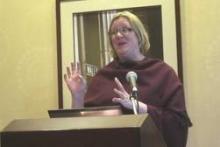NEW YORK – Nurses who lacked confidence as telephone triage advisers were more likely than more confident nurses to elevate the triage level of patients calling general practice clinics for same-day service, according to a British report.
The findings have implications for busy general practice physicians who are considering such programs to help ease their daily patient load.
Although there is “broad public support” in Britain for nurse practitioners and general nursing staff taking on many of the tasks usually associated with general practitioners, the manner in which these nurses handle patients varies greatly, according to Anna Varley, a social worker and researcher at the University of East Anglia, Norwich, England, who spoke at the annual meeting of the North American Primary Care Research Group.
“Previous research is still equivocal as to explaining exactly why it is that different health professionals make different decisions about the same calls,” Ms. Varley said to a capacity crowd.
However, data from a randomized, controlled study of telephone triage services indicated that a nurse’s self-reported level of preparedness, was key to how – and if – she advised that callers receive follow-up care.
“Therefore, standardized telephone triage training is necessary, but it may not be sufficient,” Ms. Varley said.
The data were part of the larger, clustered, randomized controlled ESTEEM trial conducted across four regions in the United Kingdom between March 2011 and March 2013 to examine the outcomes and cost-effectiveness of telephone triage services. In the study, patients seeking same-day consultations were randomly assigned with intention to treat and by protocol, to either general practice–led phone triage care; nurse practitioner–led, computer-supported phone triage care; or usual practice. Allocation was not blinded to patients, clinicians, or researchers, but practice assignment was concealed from the study’s statistician. In all, 20,990 patient calls were managed by 42 general care clinics, with 77% of all patient-clinician interactions reaching the primary outcome of additional follow-up within 28 days of the initial call. The results of the larger trial were published recently in the Lancet (2014 Nov. 22 [doi:10.1016/S0140-6736(14)61058-8]). For the subanalysis, Ms. Varley and her coinvestigators evaluated the 7,012 patient calls randomly routed to triage intervention from 45 nurses across 15 general practices in the four regions. All of the nursing staff were women, and all had been trained in the use of the clinical decision support software. All nurses were surveyed to discover their levels of training, experience, and facility with triage software. Thirty-five of the original 45 nurses returned valid profiles.
Of these, eight were nurse practitioners, an important distinction given that in the United Kingdom, this denotes more years of formal medical training than other nursing professionals, the authority to diagnose, and typically, the authority to prescribe medication.
The remaining 27 nurses were what are known in Britain as “practice nurses.” This group is not authorized to prescribe, and generally has less authority in other matters as well.
The range of the two groups of nurses’ years of experience was 2.5-40 years, although 89% of all nurse participants had 10 or more years of practical experience; 69% had 20 or more years of experience.
Across both groups, nearly half had prior experience manning triage phone lines, although only 2 of the 35 women had ever used the clinical support software.
At the time of each call, the nurses were asked to rate how prepared they felt for the particulars of the call. These data were included when evaluating how often each nurse recommended a caller for follow-up. Although most calls (86%) were recommended to some form of follow-up, nurse practitioners were less likely than practice nurses to recommend follow-up care (odds ratio, 0.19; confidence interval, 0.07-0.49). Across both groups, nurses who reported less confidence in their ability to manage the call were found more likely to recommend patients for follow-up (OR, 3.17; CI, 1.18-5.55). Additionally, less seasoned nurses, defined as those with 10 or less years of practical experience, had significantly longer mean call durations (OR, 2.58; CI, 0.76-4.40).
As reported in the larger ESTEEM trial, nurse-led triage resulted in an overall 48% increase in patient contacts over a 28-day period, compared with usual care. General practice physician–led triage resulted in a 33% increase over usual care during the same period. Despite the increase in patient contacts, the costs of care were found to remain essentially the same (about 75 British pounds sterling). Eight deaths were reported overall, including two triaged by the nurses, but none of the deaths were associated with the trial itself.


